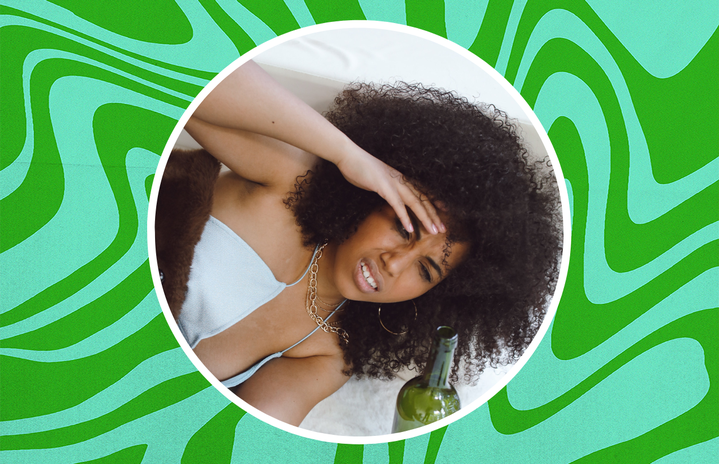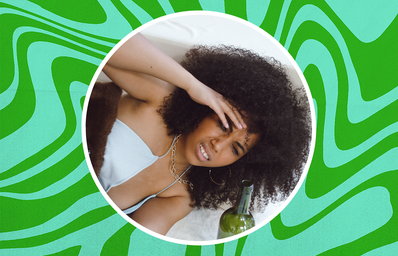Have you ever had a fun night out with your friends? You decide to let loose with some drinks and get ready to dance, mingle, or chat with whoever you might encounter on your night out!
You feel good, and you’re having a great time. Many people know the consequences of having some drinks the morning after: a wicked hangover hits, and you have a throbbing headache, you feel nauseous, your body aches, and you’re exhausted. Even though we know about the physical effects after a night out, not many individuals talk about the psychological effects of consuming alcohol the morning after.
If you’re anything like me, you might have a million anxious thoughts running through your head like,
“Why did I say that last night?”
“All my friends hate me.”
“I’m so embarrassed I acted like that.”
These are all things I have asked myself multiple times after some of the best nights out with my best friends. This common phenomenon is characterized as increased anxiety after drinking. It is colloquially called ‘hangxiety’. Quite literally, it is a phenomenon that intertwines the words “hangover” and “anxiety” and leaves many individuals feeling depressed, anxious, overwhelmed, embarrassed, paranoid, and unstable after a night of drinking.
But why? I did nothing wrong, and I sufficiently enjoyed myself. I often feel inadequate because, without reason, it seems like I’m overreacting or being dramatic when I get hit with hangxiety after a great night out. I blame myself for just being ‘an anxious person,’ but little did I know there was more to it than just having anxiety.
Although not often emphasized, in addition to the physical symptoms of a hangover, there are also many psychological effects that can affect an individual after drinking. Understanding why your body feels and reacts in a particular way in response to a specific stimulus is essential. To better understand yourself, work on your mental health, and reduce unhelpful thoughts (blame), it’s helpful to find out what’s happening in your body.
One of the central theories behind the science of hangxiety has to do with the chemical changes in your brain when you drink alcohol. Upon alcohol consumption, it’s common to feel relaxed, giddy, drowsy, impulsive and have trouble with decision-making; these are some examples of short-term effects of drinking. Hormones like serotonin and dopamine, also known as your body’s ‘happy hormones’ temporarily reduce anxiety. The relaxed and carefree feeling is due to the inhibited receptor in charge of relaxation, the GABA receptor. When it’s time for life to become normal again, and the alcohol wears off, your body will naturally try and restore its normal chemical balance. This is your body’s natural, self-regulating phenomenon called homeostasis.
This also means that in the process, you may even experience a more intense and sudden spike of anxiety while you’re dealing with the physical response of drinking (the horrible hangover) and regretting the drinks from the day before. That’s not to say the hormones in your brain act alone. Healthline suggests that lifestyle also affects how hangiexty differs among individuals. People diagnosed with social anxiety, those who are highly shy, or even individuals who have a poor sleep schedule may experience more intense hanxiety. This also may be the case for individuals who may not have the best nutrition or who are prescribed certain medication.
Depending on how much you had to drink and your physical health (i.e., your age or liver health), symptoms of hangxiety can last for upwards of 24 hours or more. This is why I’ll be sharing some of the ways I deal with my doomed anxiety after a night out. It doesn’t always make it go away, but it helps me calm down and get some insight into how I feel:
1. Taking care of myself
Drinking water, eating good food, having some vitamins and refueling myself. Supplying myself with as many nutrients as possible helps my body recover from anxiety a lot quicker. Also, I find taking a shower, doing some skincare, and feeling fresh allows me to ‘reset’, almost like I am washing away all the negative feelings associated with hangxiety.
2. Going on a walk
Although pulling myself out of bed seems daunting, taking a quick walk always helps me clear my mind and get my blood pumping without overdoing it. Taking deep breaths and enjoying the change of scenery helps get my mind away from the anxious feelings.
3. Do some deep breathing & meditation
When feeling doubtful and anxious, I do some deep breathing exercises and meditate! Mindfulness meditation has been proven to help reduce stress and anxiety by training your attention to concentrate on positive emotions. Taking big, deep breaths helps me stabilize my thoughts and feelings of worry.
4. Don’t overthink it
A lot of hangxiety simply comes from overthinking and replaying my entire night over and over again in my head. I find that when I start to criticize all my interactions from the night before (inwardly cringing at the same time), my hangxiety just becomes worse. I like to remind myself to put it into perspective that most of the time, what’s true for me is also true for many others. Everyone was in a similar state and most likely wasn’t paying as much attention to me as I thought. I am my most prominent critic and judge, so I remind myself to be kinder and more confident. I am allowed to have fun and have silly moments!
5. Reaching out to my friends
It’s not a bad thing to get a little bit of reassurance from my friends. Sometimes, I like to ask one of my close friends to talk and recount the night together. We discussed the fun events, and I was reassured that everything was OK! It helps to hear it from somebody else.
It’s completely normal to experience hangxiety. Making an effort to understand why you might feel anxious can help you find reasonable solutions that work to reduce your stress. Learning to combat negative or unhelpful feelings also allows you to enjoy the significant parts of going out and spending time with loved ones. Cheers!


